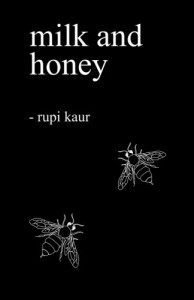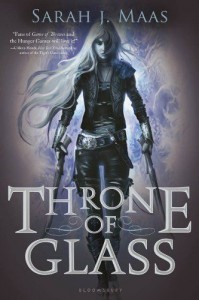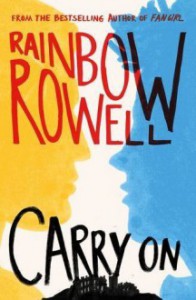Finally able to relax after two weeks of exams.
I promise I'm alive and I still love reading books.
Finally able to relax after two weeks of exams.
I promise I'm alive and I still love reading books.

Didn't take long for me to get sick of the line breaks. Felt like I was reading a collection of tumblr quotes trying really hard to turn a simple thought into something deep. Perhaps I just don't get poetry and this is what poetry is now -- small simple thoughts that happen to cross the mind, but this had to be the most repetitive book I have ever read. Most of the pages don't have more than one sentence and I can't help but think how much wasted space went into this project. Don't waste so much paper for aesthetic purposes. Get your point across first then consider your aesthetics, but the amount of poems that ended vague baffled me. It far out-weighed the amount of strong poems that hit me hard. I can see why this became such a popular book considering the digital era we now live in. People want to relate; they want to be understood, but they don't want to spend more than a minute deciphering a poem. They want something simple. Kaur's poetry is perfect for the reblogging, like-and-subscribe generation.
Though the issues she covered in the book were highly significant, her writing just didn't give them the right punch. It was all surface-level for me. She could have gone deeper. The same reaction I had for her poetry was the same I had for this quote from the Office (if you can't tell by now, I love the Office)...

.... okay?.... What of it? Is there more to that thought?
I mean kudos to Kaur for knowing how to sell poetry.
But dear reader, there are much better poetry books out there for you to read.

Not what I expected after hearing raving reviews from friends and seeing a line up of the series in the recommendation aisle at bookstores. Perhaps that's my fault for setting my expectations too high based on other people's opinions, but the quote advertised on the front cover of the book ("Fans of Game of Thrones and the Hunger Games will love it!" -Colleen Houck) is very misleading. Considering the impressive quote they decided to go with on their cover and the heroine's reputation known as the BEST assassin there ever lived, what I got was chapters trying to convince me that deep down she's a girl and not some killing machine.
This whole book seemed to want to humanize her after years of her being this emotionless, cold-blooded murderer by putting her in beautiful gowns and grand balls and hot situations with two different men. A lot of her actions didn't seem to resemble an assassin, like what assassin eats a mysterious bag of candy brought to her bed when there are murders happening every week? Also, with her experience in Endovier, I assumed she wouldn't be all "oh hey there" when she wakes up to a person by her bed. Wouldn't it take months, if not years, to shake off the need to protect herself by staying alert and slashing whoever dared to be near her during her vulnerable state? She's constantly reminding the reader that she's holding back a lot of herself to prove she can do this without unleashing her psycho past. And, yes, I appreciate Maas for showing us that there's more to Celeana than an assassin, but I had hoped for more blood and gore. I had hoped for the small details that showed how much abuse and slavery had taken a toll on her. I had hoped to see what Celeana was made of since I went through 55 chapters of her telling me she's all that. I want to read it to believe it.
What I expected...

What I got...

The fantasy setting was refreshing and the whole concept of Wyrdmarks and the Fae race intrigued me to read more. I enjoyed the girl-power vibe to the whole story. It was smart of Maas to mention Celeana's menstrual cycles during her training for it made the character all the more real. Princess Nehemia is one of my personal favorites and I'm glad all ties of romantic relationships in the story were brought to an end because that was getting pretty annoying. (But oh...wait...I wonder what the second book will be about now that Celeana's officially single) Anyways, I'll continue the series with hopes of Celeana actually proving her worth as an assassin and hopes of reading more on Wyrdmarks and the other side.
But really... Take that misleading quote off the cover. It's not like Game of Thrones.

I'd gone through Fangirl a year before and reading snippets of Cath's fan-fiction on the magical world of Simon Snow was my favorite part of the experience. And now, wish granted! That's what we get for having an author who understands the deep emotions of a fangirl. However, halfway through this book, I realized I'd enjoyed reading the world of Simon Snow because it satisfied the inner Potterhead in me and gave me a taste of Hogwarts once more. There were moments where I had to remind myself that it was a published book and not a Harry/Draco fic. And this may have soured my opinion of Rowell as a writer. Just a bit.
The story takes a while for things to pick up a bit. Much of the first half is about setting everything in place and building the world of Watford, but really, who is it fooling? It is without a doubt based on Rowling's Wizarding World and no one needed to be filled in. I felt weird reading something that was basically a substitute of an original work and I couldn't escape into that world without being reminded of that fact.
Simon's the typical hero -- strong, moral, yet rash and slow to piecing things together. Baz was my personal favorite. There's a lot of layers to him, which made him more human than Simon or any other character (ironically). His moral conflict with his own race and questions pertaining to the death of his mother made him a solid round character. He's like a precious cinnamon roll who likes to think he's salty and spicy as hell. Penelope Bunce is an obvious Hermione Granger. Headstrong, smart, and fiercely independent. A classic example for young female readers to look up to. Best of all, she's Indian -- a race that's hardly represented in YA novels -- and she rocks her curves -- a feature that's often used in stories to encourage female characters to change. Agatha Wellbelove on the other hand, her purpose in the book seemed ... pointless. The only part she contributed to the storyline was Simon catching her hold hands with Baz. A typical tool to develop an unnecessary love triangle. She didn't have any ambitions toward anything but to move to California to become a normal person. But I have to admit her lack of interest in the magical world showed some diversity to the idea that not everyone who has magic wants magic.
The spells in Rowell's magical world took some getting used to. Instead of following the traditional Latin-inspired spells, spells such as "open sesame" and "cat got your tongue" made me feel like I was reading a children's book. Oh well.

Basically, if you long for another book to give you that nostalgic Harry Potter-esque feeling with a dash of Harry/Draco fic, give this book a try.

Placing J.K. Rowling's name big and center is very misleading considering how the story wasn't her idea. She was simply a contributor of facts concerning the wizarding world and its complex characters, which was unfortunately wasted on a watered down story of something that was perfect on its own. I still hold true to J.K. Rowling and her brilliant writing, and will continue to buy her books. I understand her carefully thought out world was handled not with the upmost care, but I'm sure they had good intentions. I just hoped for this story to go in a different direction. I wanted to follow the new students starting their first year at Hogwarts and learn more of the castle's secrets and follow their own journey in the wizarding world. But this book exists as a reminder that we don't always get what we want.

A few questions... Just a few.
1. Did Jack Thorne and John Tiffany read the books? Did they binge watch half of the movies and decide they could come up with a story as good as its predecessors? From start to finish, the script format could not disguise their lack of knowledge on the beloved characters and their cringe-worthy, cliche dialogue.
2. What the hell is up with Ron's comedic one-liners? Has Rowling's books taught us nothing? Watching Ron act as a thick-headed sidekick in the film series was enough. I don't think I can handle a book depicting him even worse. Ron, as we know from the series, is loyal and contributes much to the trio as Hermione and Harry does. He isn't helpless, he isn't a coward, he isn't a comic relief.
3. Cedric Diggory as a dementor, really? Really?
4. Why write 100+ pages of sexual tension between Albus and Scorpius only to abruptly cut it loose at the end with Scorpius asking Rose out? We all know a thing or two of platonic friendships, and that, sir, was not one.
5. Whose idea was it to turn the trolley lady into some grenade-throwing Wolverine?

6. Aside from not understanding Ron's characteristics, I'd hoped they'd know Hermione's. Predicting Hermione as a bitter, old woman due to Ron's love interest towards Padma Patil is a big slap to all of us. What part of Hermione gave the impression that her future depended solely on a boy? She's taught millions of girls to be independent and to voice their opinions.
7. You want me to believe Voldemort and Bellatrix got busy in the sheets before the Second Wizarding War? I understand they had a strange fangirl-worships-the-dark-lord relationship, but linking the new villain to Voldemort this way seemed...a lazy move. Bellatrix's love for Voldemort was never hidden, however, as Rowling herself stated in an interview, "[Voldemort] loved only power, and himself. He valued people whom he could use to advance his own objectives."
BUT I did appreciate...
1. Scorpius. He has easily become one of my favorites in the Harry Potter world.
2. As much as I hate Harry's behavior in wishing Albus was never born, his relationship with his sons seemed rather real. Lacking a father figure in one's childhood can affect one's future as a father.
3. Hermione kicking ass as the Minister of Magic and paving a path for future Muggleborns to dream bigger and higher.
4. Despite how depressing and illogical the alternate universes were, it was exciting each time to read what the next one would look like.